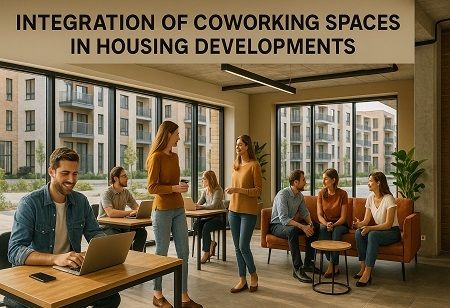
The Indian real estate market is experiencing a profound revolution, with coworking spaces in India leading the charge in housing developments. With urban lifestyles evolving and remote working becoming commonplace, developers are beginning to incorporate co-living and co-working spaces into residential projects to meet consumer demand. This article analyzes how coworking and housing integrations are evolving Indian real estate trends with innovative work-from-home solutions in India and hybrid living spaces.
How Coworking Spaces Are Designed for Residential Projects
Coworking space design in India emphasizes both functionality and aesthetics. With intense competition, developers are focused on functionality and meeting both corporate and community needs, ensuring natural light, sound insulation, and flexible layouts to achieve suitable and productive working environments. Also, developers have leveraged recent technological innovations in coworking spaces in India, such as smart lighting, and IoT-enabled devices that enhance user experience.
Projects in Bangalore and Pune develop urban housing with community-driven workspaces that encourage social behavior; bring residents together for work, socializing, community events, etc. This brings added value to the property and enhanced value to the developer's business strategy.
To mention a few, the notable residential projects with co-working spaces in India are Mantra Mirari, Pune by Mantra Properties and Developers, PS One10 (Rajarhat New Town, Kolkata) Saipme Housing (Candolim, Goa), and Prestige Shantiniketan (Whitefield, Bangalore).
Paras Arora, Founder & CEO, Qdesq highlights, “Coworking spaces within housing developments are redefining urban living in India. They offer flexibility, foster collaboration, and address post-COVID workspace demands, making residential projects more attractive to millennials and remote workers.”
We use cookies to ensure you get the best experience on our website. Read more...
Copyright © 2025 HomesIndiaMagazine. All Rights Reserved.